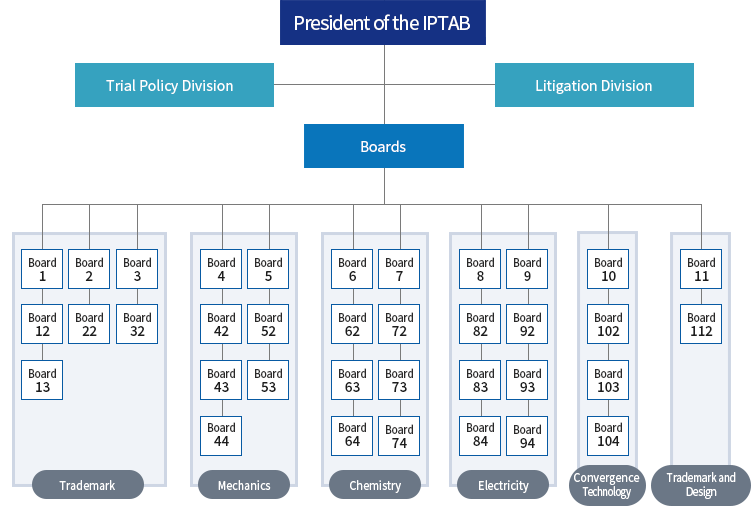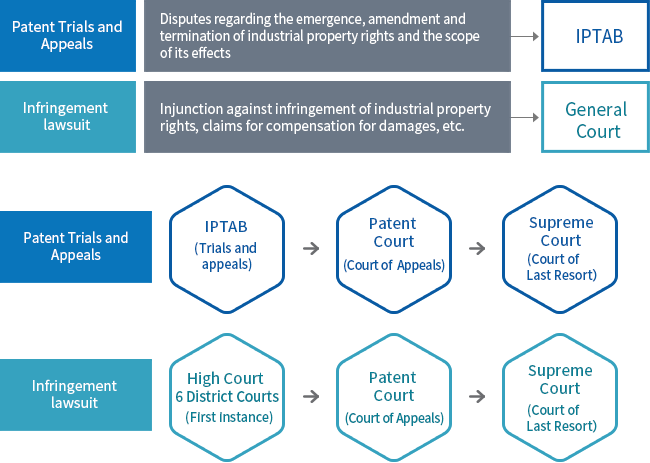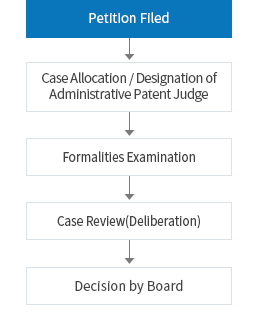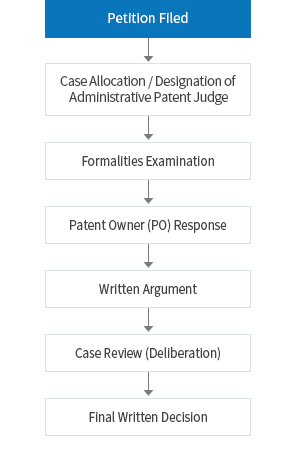The Korean Intellectual Property Trial and Appeal Board (IPTAB) conducts and hears inter partes trials and ex parte appeals that involve IP rights, including patent, utility model, design, and trademark, and renders decisions thereof. The IPTAB strives to provide transparent, coherent, reliable, yet streamlined IP dispute resolution. Further information about the IPTAB and its proceedings can be found below:
Overview of the IPTAB
Organization of the IPTAB
Patent Trial and Appeal System
Patent Administrators for Foreign-domiciled Applicants
Trial and Appeal Procedure
Overview of the IPTAB
The IPTAB is a quasi-judicial body which has been independently operated within the Ministry of Intellectual Property (MOIP) since 1 March, 1998. The Board provides an independent review of adverse decisions made by examiners called ex parte appeals and also adjudicates disputes over the validity of issued patents called inter partes trials. Unlike other administrative trials and appeals, one must exhaust administrative remedies prior to seeking judicial review for IP-related cases. In that sense, one can file a lawsuit before the Court only after he/she has decisions from the IPTAB.
Since its operation, the IPTAB has strived to expand its pool of qualified administrative judges and help them to develop their capabilities and competencies. Furthermore, the Board also aims to provide fair, transparent, effective and streamlined proceedings..
Organization of the IPTAB
As shown in the organizational chart below, the IPTAB consists of 36 Boards, a trial policy division and a litigation division under the leadership of the President of the IPTAB.
Each Board is managed by a chief presiding administrative judge and hears and decides trial and appeal cases with different technical fields. Trial policy division is a Board operations division which supports and administers proceedings and hearings and also conducts formalities examination, trial quality evaluation, etc. Litigation Division defends the IPTAB decisions before the Court for cases in which the Minister of the MOIP is the defendant.

In the majority of cases, a case is reviewed in a composition of 3 administrative judges, consisting of the chairperson, rapporteur and an additional member. A panel of judges shall deliberate regarding the decision to be taken. An expanded panel of 5 judges, may hear and decide the case where appropriate, including cases involving issues that span a number of technical fields, cases with legal/technical difficulty and/or importance.
Patent Trial and Appeal System
Significance of a Patent Trial and Appeal System
A 'patent trial and appeal' refers to a procedure in which the IPTAB makes an administrative judgment for an appeal against an examiner's decision to reject patent application or the patentability questions raised over the granted patent rights.
Korea has three-instance system for IP-related disputes and in practice, the IPTAB serves as the first instance whose decisions can be appealed to the Patent Court and Supreme Court.
Structure of the IP Dispute Resolution

Types of Trials and Appeals
1. Ex Parte Proceedings
Appeal against examiners' decision to reject patent/utility model application, etc. (Patent Act Article 132-17, Utility Model Act 33)
If a person has an objection to an examiner's decision to reject a patent application or to a decision to reject an application to register the extended term of a patent, he/she may file an appeal within 30 months from the date when he/she is served with a certified copy of the examiner's decision. An exception may be applied in cases where a person resides in an area that is remote or difficult to access. In such cases, the Minister of MOIP may extend the period to 2 months.
Re-examination (Patent Act Article 67-2, Utility Model Act 15)
With respect to a patent application filed on or after July 1, 2009, an applicant may request re-examination or file an appeal, following an adverse decision made by an examiner. A patent applicant may file a request to re-examine his/her patent application after amending the specification or drawings of the patent application within 30 months after receipt of a certified copy of the decision to reject the patent application; however, an applicant is not allowed to request a re-examination once a petition for trial is filed.
A patent applicant may file a request to re-examine his/her patent application after amending the specification or drawings of the patent application within 30 months after receipt of a certified copy of the decision to reject the patent application; however, an applicant is not allowed to request a re-examination once a petition for trial is filed.
Trial for Correction (Patent Act Article 136, Utility Model Act 33)
A patent holder may file a petition for trial to correct
specifications or drawings in any of the following cases:
-
to narrow a claim;
- to correct a clerical error; or
- to clarify an ambiguous description.
However, this shall not apply when a patent opposition is pending before the IPTAB.
Trial for correction is intended to protect a patent invention by providing an opportunity for a patentee to make corrections under the condition that there are no unexpected losses or damages caused to any third parties.
When a trial decision to correct specifications or drawings of a patented invention becomes final and conclusive, it shall be deemed that filing and laying open the relevant patent application, a decision or trial ruling to grant a patent, and the registration of the grant of the patent have been made according to the corrected specification or drawings.
2. Inter Partes Proceedings
Trial for Invalidation (Patent Act Article 133, Utility Model Act 31)
There may be some patents which should not have been granted. In such cases, an interested party or an examiner may request a trial to review the validity of an issued patent. For a patent containing two or more claims, a request for trial for invalidation may be made for each claim.
Grounds for invalidation are generally the same as the grounds for rejection of a patent application.
A trial for invalidation may be requested even after the expiration of the patent right. Where a trial decision to invalidate a patent becomes final and conclusive, the patent right shall be deemed never to have existed; however, where a patent is invalidated by any reason that arose after the granting of a patent, the patent right is deemed not to have existed from the time when such reason is originated.
Trial to Invalidate Registration for Extension of Patent (Patent Act Article 134)
An interested party or examiner may request a trial to invalidate the registration of an extension of a patent right.
Trial to Confirm the Scope of Rights (Patent Act Article 135, Utility Model Act 33)
A patentee or an interested person may request a trial to confirm the scope of a patent right. When filing a petition to confirm the scope of at least two claims in a patent, a petition may be filed for each claim.
Trial to Invalidate Corrections (Patent Act Article 137, Utility Model Act 33)
An interested party or examiner may request a trial to invalidate corrections, where the specifications or drawings of a patented invention have been corrected in violation of Article 136.
When a decision to invalidate corrections of specifications or drawings becomes final and conclusive, the correction shall be deemed never to have been made.
Trial for Grant of Non-exclusive Licenses (Patent Act Article 138, Utility Model Act 32)
When a patentee requires the use of the patent right of a prior patentee to operate his/her patented invention, or when a prior patentee refuses to grant permission to use the patent right without justifiable reasons, he/she may request a trial for grant of a non-exclusive license. To make a such request, it is required that the patented invention of the later patentee should constitute a substantial technical advance in comparison with the patented invention or registered utility model of the prior patentee.
Patent Administrators for Foreign-domiciled Applicants (Patent Act Article 5, Utility Model Act 3)
When a request for a trial is made against a foreign-domiciled applicant (a person who has neither a domicile nor a place of business in the Republic of Korea), there may be problems in receiving the copy of the written request for trial and other documents without a patent administrator, and this often causes difficulties, such as the lapse of a right. Therefore, in accordance with the Patent Act Article 5, a foreign-domiciled applicant shall not initiate any patent-related procedure or file legal proceedings, such as application, trial/appeal proceedings, etc., unless he/she is represented by a patent administrator (an agent with respect to his/her patent, who has a domicile or a place of business in the Republic of Korea).
Trial and Appeal Procedure
Ex Parte Proceedings

Inter Partes Proceedings

For more information about the IPTAB and its proceedings, please refer to the following brochure. Download
- Last updated 27 April 2023
- Trial Policy Division
